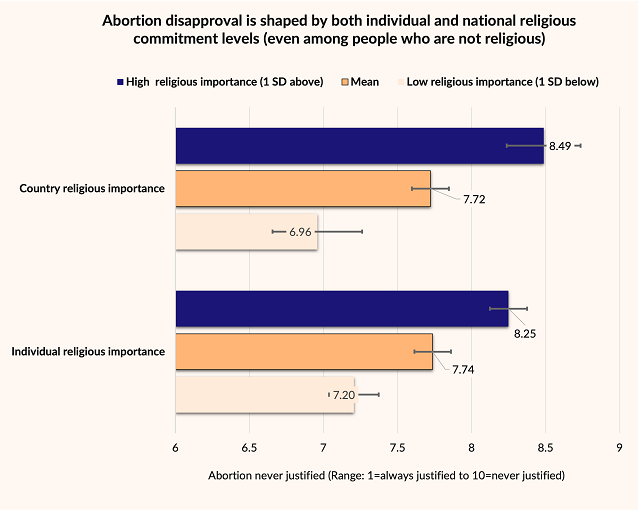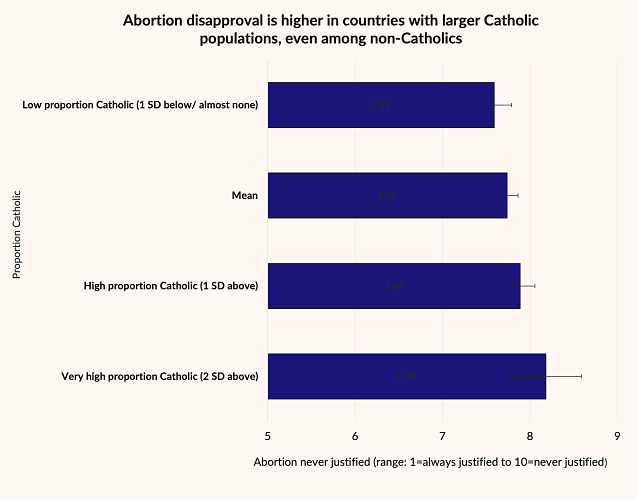Highlights
- Disapproval of abortion is higher in countries with larger Catholic populations, even among non-Catholics. Post This
- At the societal level, people living in more religious countries are also more likely to disapprove of abortion, regardless of their own beliefs. Post This
- One of the most surprising findings from my analysis is that religious affiliation has only a modest effect on abortion views. What matters far more is how important it is to a person's daily life. Post This
Religion and abortion are tightly linked in the American imagination. From courthouse steps to campaign platforms to Sunday sermons, religious beliefs, especially among conservative Christians, have long shaped how Americans think and vote on the issue. But is this connection unique to the United States? Do people in other countries respond to abortion in the same way? And what exactly is it about religion—personal faith, cultural context, or institutional power—that most strongly shapes people’s attitudes?
To answer these questions, I drew on two sets of data for my latest book, Fetal Positions: Understanding Cross-National Public Opinion about Abortion. First, I analyzed survey responses from three waves of the World Values Survey, which includes over 200,000 people in 88 countries, covering every major world religion and representing the vast majority of the global population. Then, I conducted a comparative case study of China and the United States, interviewing 40 individuals, including religious leaders, medical professionals, social movement organizers, academics, and government workers. While we already know a good deal about how religion shapes abortion attitudes in the United States and other Christian-majority nations, we know far less about these dynamics in more secular contexts, especially those shaped by non-Christian traditions. By examining both a deeply religious democracy and a largely secular state that once enforced a one-child policy, the comparison between the U.S. and China offers a unique window into how religion may or may not shape attitudes in very different social environments. Taken together, the data reveal a consistent and striking global pattern.
It’s Not Which Religion You Practice; It’s How Much It Matters
One of the most surprising findings from my analysis is that religious affiliation—whether someone identifies as Christian, Muslim, Hindu, Buddhist, or Jewish—has only a modest effect on abortion views. This makes sense when we consider that all of these traditions contain teachings that discourage or problematize abortion. But simply identifying with a religion is not the decisive factor.
What matters far more is religious importance, or how central a person’s faith is in their daily life. People who say religion is very important are significantly more likely to disapprove of abortion than those who say it is not. This measure of religious intensity provides more insight into abortion attitudes than gender, age, income, marital status, or education. These findings are illustrated in Figure 1, which shows that people who say religion is very important have the highest abortion disapproval level (8.25 on a scale ranging from 1=always justified to 10-never justified).

Why is that the case? One reason is social learning. People who consider religion important are more likely to regularly attend services, read religious texts, and engage with faith-based media. These practices expose them to consistent moral messages about abortion and deepen their sense of belonging in communities where opposition to abortion is often the norm.
Another dynamic is social control. People who are active in religious communities tend to form close interpersonal bonds. These relationships come with expectations and pressures. Individuals may adopt anti-abortion views not only because they hear them from religious leaders, but also because they want to maintain harmony and respect within their social circles.
These same dynamics can also limit exposure to alternative views. Abortion is often stigmatized, particularly in religious communities, which means that people who have had abortions may choose not to speak about their experiences. As a result, religious individuals may not think that they know anyone who has had an abortion or understand the reasons why someone might seek one. This lack of exposure strengthens disapproval.
Abortion views are not just political opinions or personal preferences. They are deeply rooted in moral cultures shaped by religion, through personal devotion, collective identity, and the social environments we inhabit.
The Power of the Religious Climate
Abortion attitudes are not only shaped by personal belief. Where you live also matters. Even after accounting for people’s personal religiosity, I found that those living in more religious countries are significantly more likely to disapprove of abortion.
This is what sociologists call a contextual effect. In societies where religion is highly valued, moral views on abortion are more likely to be embedded in media, education, politics, and everyday life. Even individuals who are not personally religious often internalize dominant moral messages or refrain from expressing dissent.
The results were clear. Country-level religious importance was the strongest national-level predictor of abortion disapproval. It mattered more than a country’s wealth, education system, gender equality, or political structure. In fact, as Figure 1 shows, personal religiosity and national religiosity have nearly identical effect sizes, meaning they have similar power to shape abortion disapproval, even after we account for a range of individual traits (e.g., age, gender, education, and personal religiosity), and other country characteristics.
This finding has major implications. It means that even secular individuals are shaped by the religious cultures they live in. If you live in a highly religious country, you are more likely to disapprove of abortion, even if you do not consider yourself religious. The climate shapes not just policy, but also personal morality.
The Catholic Church’s Cultural Reach
Does the type of dominant religion in a country matter? I explored whether countries with majorities of different religious traditions, such as Islam, Protestantism, or Catholicism, had distinct patterns of abortion views. The only tradition that showed an additional influence was Catholicism, and its effect size is illustrated in Figure 2.

Even though identifying as Catholic does not significantly shape abortion attitudes at the individual level, the Catholic Church has had a meaningful cultural and political impact in countries where it is closely tied to national identity. In places like Poland, Catholic teachings are woven into national narratives about morality and tradition. Even as religious practice has declined, the Church’s influence, especially in South American nations, persists through political rhetoric, public institutions, and cultural norms.
The Catholic Church has also played a central role in abortion debates in the United States. Early on, the Church framed its opposition to abortion as part of a broader social justice ethic, focused on human dignity and care for the vulnerable. Over time, conservative Protestant groups joined the pro-life movement, emphasizing moral order, sexual ethics, and traditional family structures. Together, these religious coalitions helped shape national debates and drive public disapproval.
In these contexts, Catholicism functions less as a personal identity and more as a cultural and institutional force. People may disapprove of abortion not because of personal belief, but because Catholic influence permeates the moral and political environment.
Why Religion Still Matters
The global picture that emerges from the research I conducted for Fetal Positions is both nuanced and striking. At the personal level, people who say religion is important to them are much more likely to disapprove of abortion, regardless of their specific faith. At the societal level, people living in more religious countries are also more likely to disapprove, regardless of their own beliefs. And in historically Catholic societies, the Church continues to shape public opinion through culture, politics, and national identity.
These findings underscore an important truth. Abortion views are not just political opinions or personal preferences. They are deeply rooted in moral cultures shaped by religion, through personal devotion, collective identity, and the social environments we inhabit. In understanding how people around the world think about abortion, we cannot ignore the enduring power of faith.
Amy Adamczyk is the author of Fetal Positions: Understanding Cross-National Public Opinion about Abortion (Oxford University Press, 2025).
Editor's Note: The opinions expressed in this article are those of the authors and do not necessarily reflect the official policy or views of the Institute for Family Studies.
*Photo credit: Shutterstock










